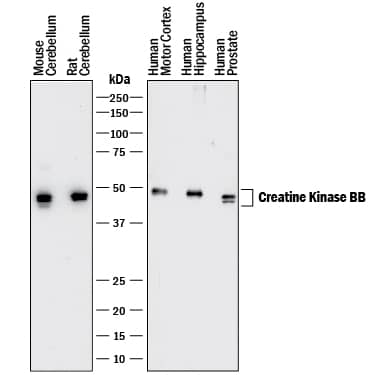Human/Mouse/Rat Creatine Kinase BB Antibody
R&D Systems, part of Bio-Techne | Catalog # MAB9076

Key Product Details
Species Reactivity
Validated:
Human, Mouse, Rat
Cited:
Mouse, Transgenic Mouse
Applications
Validated:
Immunocytochemistry, Western Blot
Cited:
Western Blot
Label
Unconjugated
Antibody Source
Monoclonal Mouse IgG1 Clone # 969409
Product Specifications
Immunogen
E. coli-derived recombinant human Creatine Kinase BB
Pro2-Lys381
Accession # P12277
Pro2-Lys381
Accession # P12277
Specificity
Detects human Creatine Kinase BB in direct ELISAs and Western blots.
Clonality
Monoclonal
Host
Mouse
Isotype
IgG1
Scientific Data Images for Human/Mouse/Rat Creatine Kinase BB Antibody
Detection of Human, Mouse, and Rat Creatine Kinase BB by Western Blot.
Western blot shows lysates of mouse and rat brain (cerebellum) tissue, human brain (motor cortex and hippocampus) tissue, and human prostate tissue. PVDF membrane was probed with 0.1 µg/mL of Mouse Anti-Human/ Mouse/Rat Creatine Kinase BB Monoclonal Antibody (Catalog # MAB9076) followed by HRP-conjugated Anti-Mouse IgG Secondary Antibody (Catalog # HAF018). A specific band was detected for Creatine Kinase BB at approximately 45 kDa (as indicated). This experiment was conducted under reducing conditions and using Immunoblot Buffer Group 1.Creatine Kinase BB in SH‑SY5Y Human Cell Line.
Creatine Kinase BB was detected in immersion fixed SH-SY5Y human neuroblastoma cell line using Mouse Anti-Human/Mouse/Rat Creatine Kinase BB Monoclonal Antibody (Catalog # MAB9076) at 8 µg/mL for 3 hours at room temperature. Cells were stained using the NorthernLights™ 557-conjugated Anti-Mouse IgG Secondary Antibody (red; Catalog # NL007) and counterstained with DAPI (blue). Specific staining was localized to cytoplasm. View our protocol for Fluorescent ICC Staining of Cells on Coverslips.Applications for Human/Mouse/Rat Creatine Kinase BB Antibody
Application
Recommended Usage
Immunocytochemistry
8-25 µg/mL
Sample: Immersion fixed SH-SY5Y human neuroblastoma cell line
Sample: Immersion fixed SH-SY5Y human neuroblastoma cell line
Western Blot
0.1 µg/mL
Sample: Human brain (motor cortex and hippocampus) tissue, human prostate tissue, and mouse and rat brain (cerebellum) tissue
Sample: Human brain (motor cortex and hippocampus) tissue, human prostate tissue, and mouse and rat brain (cerebellum) tissue
Formulation, Preparation, and Storage
Purification
Protein A or G purified from hybridoma culture supernatant
Reconstitution
Reconstitute at 0.5 mg/mL in sterile PBS. For liquid material, refer to CoA for concentration.
Formulation
Lyophilized from a 0.2 μm filtered solution in PBS with Trehalose. *Small pack size (SP) is supplied either lyophilized or as a 0.2 µm filtered solution in PBS.
Shipping
Lyophilized product is shipped at ambient temperature. Liquid small pack size (-SP) is shipped with polar packs. Upon receipt, store immediately at the temperature recommended below.
Stability & Storage
Use a manual defrost freezer and avoid repeated freeze-thaw cycles.
- 12 months from date of receipt, -20 to -70 °C as supplied.
- 1 month, 2 to 8 °C under sterile conditions after reconstitution.
- 6 months, -20 to -70 °C under sterile conditions after reconstitution.
Background: Creatine Kinase BB
References
- Trask R.V. et al. (1988) J. Biol. Chem. 263:17142.
- Wallimann, T. et al. (1992) Biochem, J. 281:21-40.
- Wallimann, T. (1994) Curr. Biol. 4:42.
- Wu, Z.L. (2011) PLoS One 6:e23172.
Alternate Names
B-CK, CKB
Gene Symbol
CKB
UniProt
Additional Creatine Kinase BB Products
Product Documents for Human/Mouse/Rat Creatine Kinase BB Antibody
Product Specific Notices for Human/Mouse/Rat Creatine Kinase BB Antibody
For research use only
